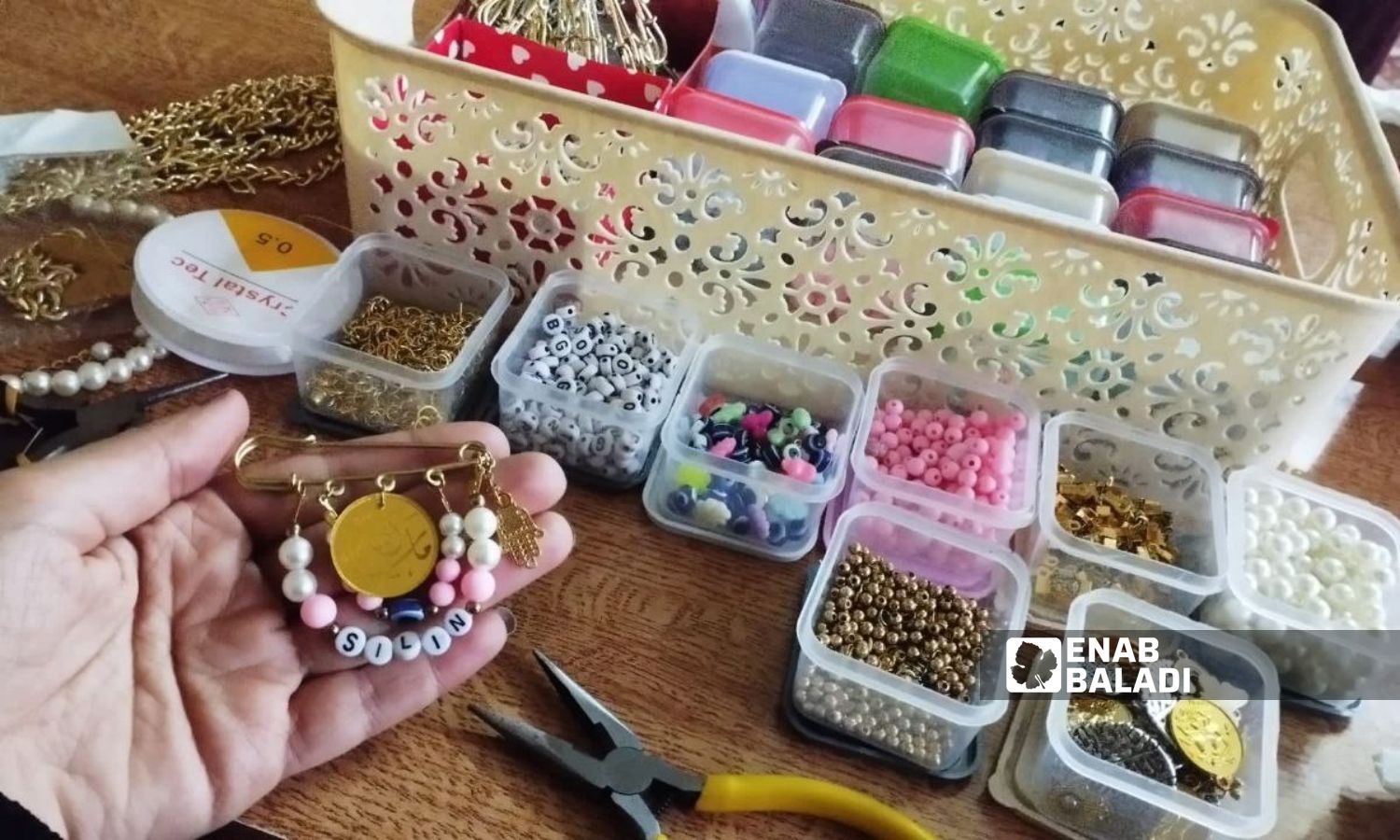



Enab Baladi – Sarah al-Ahmad
Samira (28 years old) started learning sewing about a year ago as part of a small workshop set up in a home in the city of Douma, rural Damascus. She told Enab Baladi that her deteriorating financial situation and the high prices of clothes in shops drove her to work to become a source of livelihood for her after the death of her husband.
About five months ago, the woman began sewing dresses for occasions for one of the shops in the city, and her profit for each piece reaches about 70,000 Syrian pounds.
Samira is one of many women in the city of Douma who have resorted to learning trades, whether at home or in special workshops, to meet the basic needs of their families, amid a declining economic and living situation and government salaries being insufficient.
A supervisor of a sewing workshop in the city of Douma (who requested anonymity for security reasons) told Enab Baladi that sewing workshops and handicraft industries are continuously increasing as women flock to learn and work due to the difficult living conditions.
She added that the number of garment sewing workshops, knitting workshops, and manual embroidery reaches about 15 workshops, some of which are home-based and some within small workshops.
She mentioned that these workshops have succeeded in helping women improve their living standards, as some workshops employ women to work after completing their training and education, with a monthly salary reaching 300,000 Syrian pounds.
The average cost of living in areas under regime control is more than 10.3 million Syrian pounds, with the minimum being 6.5 million pounds, while the minimum government salary is approximately 279,000 pounds (the dollar being 14,650 pounds).
Samira explained that some women want her to sew for them; the price of a women’s woolen shirt reaches 400,000 pounds in the market, while its cost of tailoring reaches 150,000 pounds, including fabric, buttons, and tailoring wages.
She mentioned that the price of a velvet “galabia” (a traditional garment) in shops reaches 600,000 pounds, while the cost of tailoring and materials reaches 200,000 Syrian pounds.
However, Nawal (23 years old), a divorcee with two children, works from her home making accessories for occasions and items related to newborn children, or engagement stands and the like. She said that learning this craft requires successive courses in special workshops.
She mentioned that the cost of each course reaches 500,000 Syrian pounds, and due to her financial inability, she turned to regularly following YouTube until she mastered her craft.
Nawal clarified that she sells a piece of brooch, a handmade necklace for newborn children, at a price of 30,000 pounds, and its cost is 20,000 pounds, which leaves 10,000 pounds profit for her. For wooden stands and plexiglass pieces, she gets them from workshops at a cost of 20,000 pounds per piece, as she cannot afford to buy the specialized machines for them.
The price of a plexiglass machine is 35 million pounds, and a laser printing machine is 50 million pounds (plexiglass is strong transparent plastic that serves as an alternative to glass).
Nawal complained to Enab Baladi about several issues she faces, the first being the continually rising price of the cut materials. For example, making a brooch for newborn children requires her to buy by the kilo, and the price of a kilo of commercial pearls ranges between 50,000 and 100,000 pounds, depending on the type, while the price of a kilo of letters reaches 125,000 pounds.
Nawal said that her attempts to market her work through handcraft groups were unsuccessful because each group asks for 60 US dollars for each advertisement, which pushed her to publish on her personal Facebook page only.
Nawal’s attempts to contract with shops within Douma markets have not succeeded, and she delivers orders herself within the cities of the Ghouta region as requested.
These projects are attempts to bridge a large gap in needs, as about 90% of Syrians live below the poverty line, and there are 15.3 million people in need of humanitarian assistance.
Women are among the victims of the war in Syria, and they have engaged in strenuous and dangerous jobs to secure their various needs, amid the rise in prices and low wages.
Also, some women, especially those living in the camps of the displaced persons, turn to jobs known locally to be men’s specializations, or are fraught with danger like searching among garbage piles for plastic, with the spread of unexploded projectiles from the remnants of the war.
if you think the article contain wrong information or you have additional details Send Correction